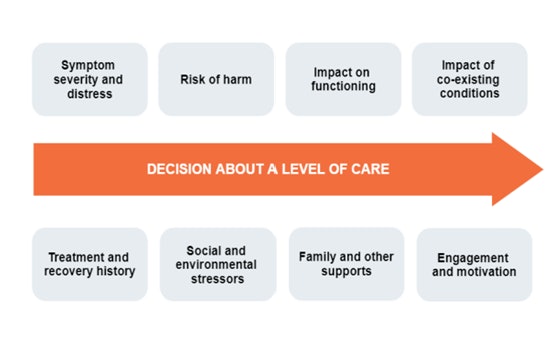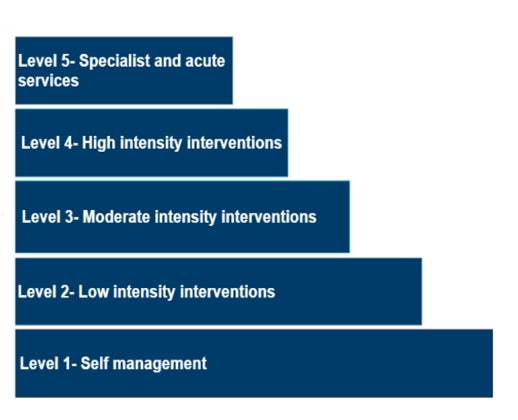Initial Assessment and Referral (IAR) Tool
What is the IAR-DST?
The Australian Government, through the Mental Health and Suicide Prevention Plan is expanding and implementing the Initial Assessment and Referral (IAR) tool in primary care. The IAR Guidance and Decision Support Tool (IAR DST) is a holistic decision-making framework that uses the stepped care approach to assist general practitioners and clinicians in matching consumers with the most appropriate mental health services for their needs.
Guided by practitioner assessment and clinical judgement, the tool provides a consistent way for you to make decisions when matching your patient’s mental health needs with the right level of service intensity, at the right time. Widespread uptake of the IAR-DST aims to create nationwide common language across the mental health sector about what level of service intensity a person requires (Level 1 through to Level 5).
When using the IAR-DST, a person seeking mental health assistance has their experiences understood in the context of holistic assessment domains. The 8 domains help to distil essential assessment information and identify key signals (e.g., red flags) that are critical for decision making. A person’s treatment needs and recovery goals are understood and matched to a service type and intensity based on the least intensive and least intrusive evidence-based intervention that will likely lead to the most significant possible gain.


The 8 initial assessment domains that are used to match clients to one of 5 appropriate levels of care.
Why use the IAR-DST?
- Consistent and transparent referrals. The IAR-DST is being progressively introduced across federal and state mental health services, harmonising the approach to referrals and service provision right across the sector.
- Improved patient outcomes. Effective communication of a consumer's circumstances will ensure that they are matched to the most appropriate service for their needs, minimising their time within the primary care system while maximising their opportunities for improved health outcomes.
- Flexible clinical decision making. The IAR-DST is used in conjunction with other standardised assessment tools and clinical judgement to help the consumer make the most appropriate plan, while being able to flexibly adjust treatment needs in response to changes in their circumstances.
- Improved workflow. Integration of the IAR-DST within existing primary care systems and mapping of available services to each level of care will streamline decision-making processes and reduce overall administrative load.
IAR-DST training
The PHN provides a 2 hour group training workshop to help primary health clinicians understand how to use the IAR-DST, either in-person or online. The training is designed to provide you with all the information you need to use the tool in your everyday practice. Even if you don’t use it every day, the training will provide you with options to collaborate with others to use the tool in a way that suits your practice.
Please click here for further information and to register. Additional online sessions can be arranged upon request.
$300 remuneration per GP*
Once-off payment (exc. GST) provided direct to GPs or their practice upon completion of 2 hours of IAR training.
* Payment is available to GPs working in private practice or GPs working in Government funded Adult Mental Health Centres / Aboriginal Medical Services that attend outside of normal work hours. Payment is not available to other medical staff or clinicians.
Two CPD hours
Training sessions are CPD accredited activities with RACGP and ACCRM.

For further information, or to arrange a training workshop, please contact our IAR team.